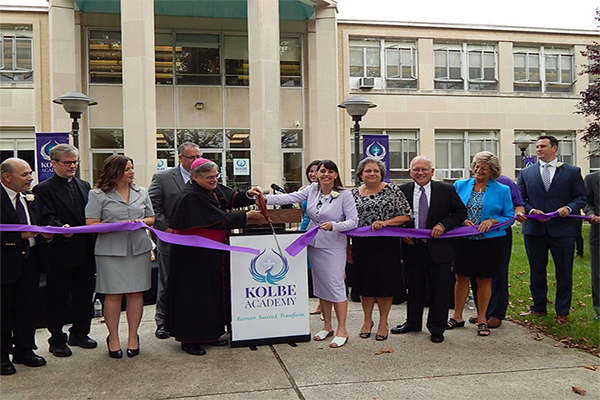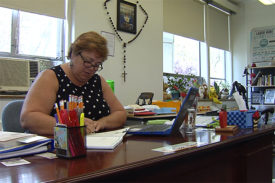
BETHLEHEM, Pa. — For Winnie Houk, the religion and English teacher at Kolbe Academy, a Catholic high school for students recovering from drug or alcohol addiction, Kolbe’s mission is personal.
That’s because Houk’s son Joe, the middle of five children, died of a drug overdose in September 2016. The loss is still incredibly painful for her, but her brother told her, “You’re going to find a way to give in his honor.”
So when Houk saw a posting on Facebook that Kolbe — a high school in Bethlehem, Pa., that was opened this year by the Diocese of Allentown — was looking for teachers, she sent her résumé.
Kolbe is a groundbreaking school. There are 36 high schools in the United States designed for students in recovery from substance abuse, according to the Association of Recovery Schools, but Kolbe is the first faith-based one.
Dr. Brooke Cortese Tesche, the diocese’s chancellor of education, was first inspired to create a recovery high school 10 years ago when she was working in special education in a public school district.
“Recovery high school is critical to impacting the community in a positive way,” Tesche said. “The need is profound.”
When she became the deputy superintendent for secondary education and special education in the diocese in 2012, she conceived the idea of Kolbe Academy, knowing that a recovery school can save a teen. According to the American Addiction Centers, within six months of completing a recovery school curriculum, just 30 percent of students relapse, compared with 70 percent of people who undergo other forms of intervention.
“So many times when students come out of rehab, they come back, and if they go back to their same friend group, they’re back in addiction,” said John Petruzzelli, Kolbe’s principal. “If they don’t, a lot of times they don’t have other friends. We’re providing them with the activities and the friends to do those activities.”
Kolbe Academy aims to provide an individualized academic program for each student with Christ at the center. Petruzzelli said he has heard from many in recovery that faith and a connection to God makes all the difference.
The school began the academic year with three students, but it has open enrollment. It has received more than 100 inquiries during the last year. It hopes to grow to between 20 and 30 students by the end of the school year. It can hold up to 100 students.
While students at Kolbe are taught the same curriculum as other diocesan schools, each student receives counseling every day. Kolbe also offers after-school social activities, called Alternative Peer Groups, with activities ranging from yoga to cooking classes.

“We really want to give them those activities so they can not only have fun, but they’re connecting with other kids that are sober, and they can see that they can do those kinds of things without having drugs or alcohol involved,” Petruzzelli said.
Tuition is $15,000 per year, which includes all fees and counseling. Some of the cost for counseling is covered by insurance. Financial aid is available.
The need for such a school is pressing. Nationally, the Substance Abuse and Mental Health Services Administration estimates that in 2013, 2.3 million people ages 12 to 17 had used drugs, and only 5.4 percent of them entered any kind of treatment program.
In the Diocese of Brooklyn, teens with substance-abuse problems can find help locally. The diocese’s Program for the Development of Human Potential (PDHP) provides alcohol, substance abuse and gambling prevention services to local Catholic elementary and high schools.
One PDHP program is Teen Intervene, which targets adolescents who display early signs of an alcohol or drug problem.
For more serious cases, PDHP will refer a student to Catholic Charities Brooklyn & Queens or to places such as Outreach, a treatment center in Richmond Hill, and Mercy Medical Center in Rockville Centre, L.I.
Salvatore Violo, LCSW, director of PDHP for Queens, said New York state has discussed creating two recovery schools, one upstate and one downstate. He said that the diocese doesn’t have the financial ability to start a recovery school like the Diocese of Allentown did. But he likes the concept.
“It’s a good way because it has been indicated that children in these high schools have a better chance of continuing to recover than children in a regular school,” Violo said.
Currents News reporter Emily Drooby contributed to this report.
